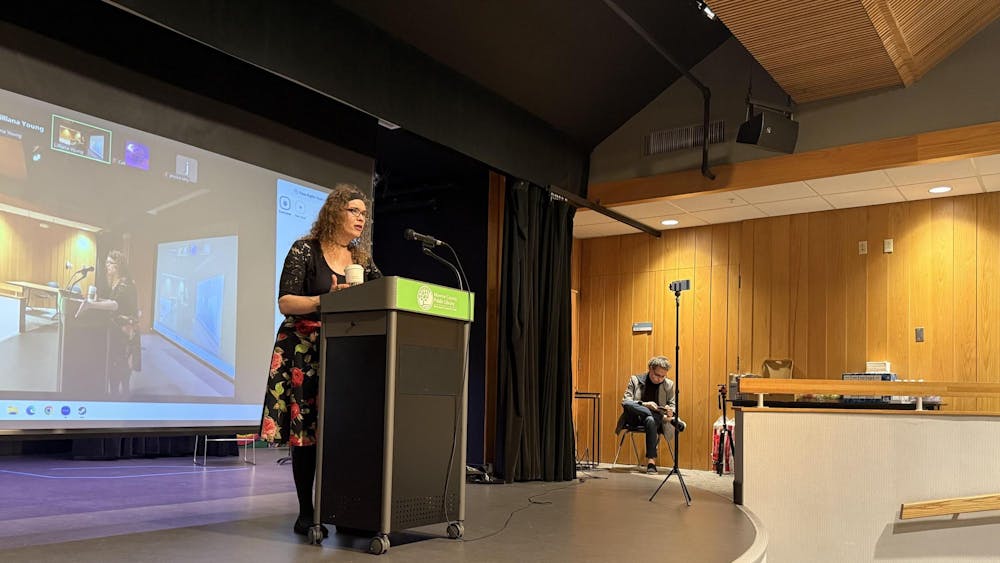William Shatner wasn’t around just yet to see the last total solar eclipse in Bloomington in 1869, but he has lived long and prospered enough to see it on April 8 from IU’s Memorial Stadium.
“The next one in Indiana will be like 100 years from now. We’ll all be dead. I might not be, but you guys are going to be dead the next time,” Shatner joked in a question-and-answer forum Monday.
Shatner, 93, gained national recognition when he captained the USS Enterprise as Captain James Kirk during Star Trek’s original run on NBC in the 1960s. His time in space was exclusive to the silver screen until 2022 when he visited the expanse for about 10 minutes on a Blue Origin flight. Shatner was accompanied by Jeff Bezos, former Amazon founder and CEO and founder of Blue Origin, Audrey Powers, Blue Origin's vice president, Chris Boshuizen, a former NASA engineer, and Glen de Vries.
Shatner had thought about going to space for almost 60 years, but nothing could have prepared him for the real thing.
After his arrival back on Earth, he told NPR that his brief experience in the cosmos filled him with “the strongest feelings of grief” he’s ever felt. Shatner described what many feel when seeing the Earth from that high up, dubbed the “overview effect” — astronauts often describe a feeling of an overwhelming state of awe after seeing a visually striking stimulus. Put simply, seeing the Earth from space leaves viewers filled with wonder and reverence, and is enough to transform an individual.
He hopes the eclipse will inspire a similar sense of awe and wonder in those looking up for those rare three-and-a-half minutes when the moon passes over the sun and darkens the bright afternoon sky.
“To me, the magic of the eclipse, the extraordinary events it all took in the heavenly bodies to cause this eclipse, should make us ponder the mystery of existence,” Shatner said.
The probability of the eclipse itself is astonishing. The moon is 400 times smaller than the sun, but also 400 times closer to the Earth than the sun is. This makes the sun and moon seem roughly the same size to the human eye when viewed on Earth.
Shatner will join Janelle Monáe, a Grammy Award-nominated singer/songwriter/actress and Mae Jemison — the first American woman of color to travel to space — on stage during the Hoosier Cosmic Celebration at Memorial Stadium on April 8. Shatner said he intends to present a 15-minute spoken word performance before the eclipse occurs.
Born in 1931, Shatner’s career in science fiction was at the climax of the international space race. Apollo 11 landed the first men on the moon during the original show’s final season in 1969. Shatner believes humanity is already on the verge of space exploration becoming another cultural phenomenon again.
The U.S., India, Russia and China have all continued to launch missions to the moon in recent years. The first-ever private company landed on the moon earlier this year, and became the first American vehicle to do so in nearly 50 years. Officials from NASA, Russia and China have predicted that the first humans will live on the moon within a decade, but official timelines have yet to be given.
“One of the curses, and one of the benefits of humanity is our curiosity, and we will never overcome that curiosity,” Shatner said.
Although simple in comparison to humans living on the moon, the eclipse is an opportunity for millions of people to look up — physically and metaphorically — at something bigger. Shatner believes there is beauty in simply looking and asking questions.
“The mystery, the beauty of our existence — to examine that is a voyage we all have to take,” Shatner said.
After his return to Earth, Shatner said he is more appreciative and protective of the planet than ever. He has become an international advocate for drastic action on addressing climate change and hasn’t held back in his summary of humanity’s treatment of its own home. Shatner believes humanity is at a tipping point, where damage due to climate change could become irreparable, and action must begin now.
“I played my part in popularizing the idea that space was the final frontier,” Shatner wrote in a column for The Guardian in 2022. “But I had to get to space to understand that Earth is, and will remain, our only home. And that we have been ravaging it, relentlessly, making it uninhabitable.”
Shatner said he’s acutely aware of life’s preciousness and temporary nature. He asks himself every day whether this will be the day he dies, yet every day so far, it hasn’t been. So far, he continues to be alive, and if the streak continues, he will try to accomplish the most he can, whether that’s spending time with loved ones or simply thinking about life and the environment — as long as he’s enjoying himself.






